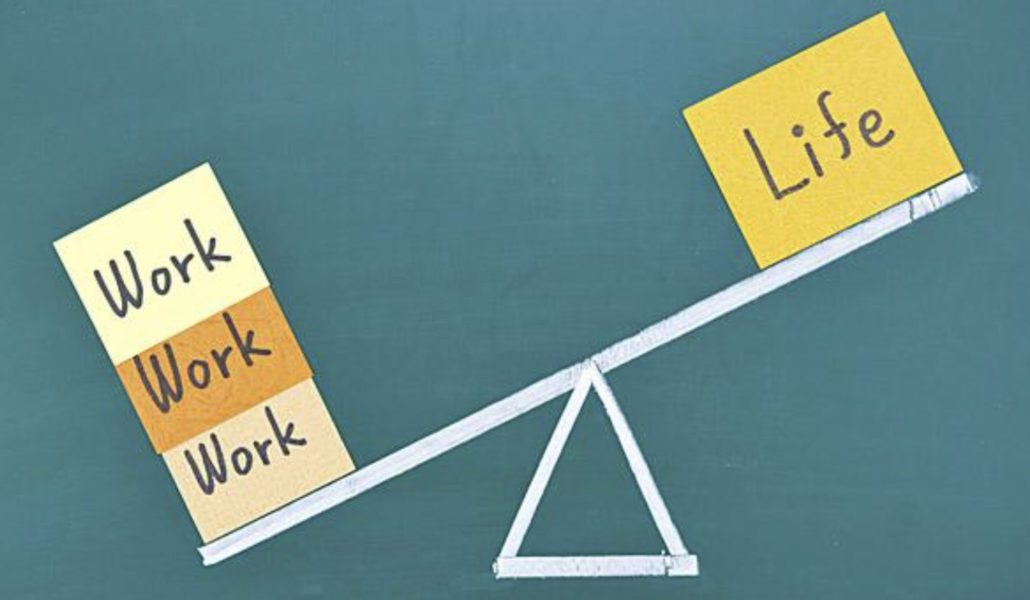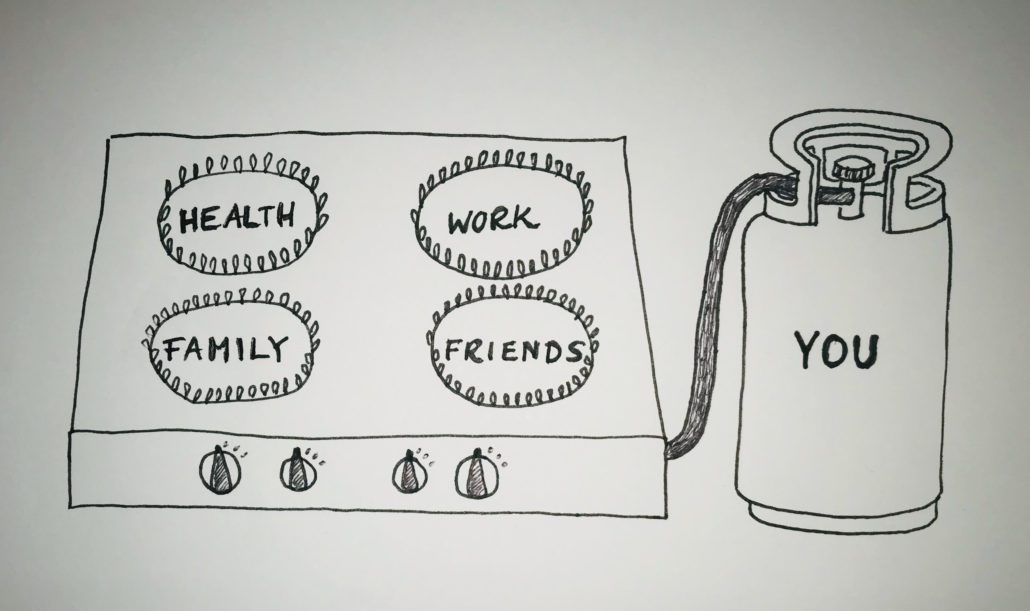

Leonie Hurrell explains how you can’t do everything, all the time. Here’s how to have a healthy work-life balance.

Everyone talks about the importance of achieving a good work-life balance. In theory, once you have a perfect balance your life will be great. However, the definition of ‘balance’ is to keep something in a steady position consistently. Clearly, our modern-day lives are anything but steady or consistent, which is why a good work-life balance remains elusive for so many of us. Also, the theory of work-life balance considers work and life as separate entities and opposite sides of a scale but in reality, work is a (big) part of life and for many, it provides us with purpose, satisfaction and financial security.
So what if we can find a new way of looking at our work-life balance, one that is more realistic and will help us feel better? I believe it is worth exploring another model, which is based on the concept known as the Four Burners Theory.
The Four Burners Theory, which I first discovered in an article by the talented James Clear, is explained by imagining that your life is represented by a stove with four burners on it. Each burner symbolises one major quadrant of your life.
The first burner represents your family.
The second burner is your friends.
The third burner is your health.
The fourth burner is your work.
The original Four Burners Theory says that, “In order to be successful you have to cut off one of your burners. And in order to be really successful, you have to cut off two.”
However, I don’t personally believe this to be true. My adapted model (as shown in the diagram below) includes the gas tank (you) to fuel your burners and the dials to control them.

In this model, the burners (your life) are fuelled by you; the gas is your energy. If you have all the areas in your life turned up high then you will burn out and have no energy left. It’s important in this model to keep your tank well fuelled and be in control of turning up (or turning down) the heat in any of the four areas of your life to conserve your energy.
There are three main ways of managing your burners successfully.
Firstly, learn about tradeoffs and seasons.
Let’s face the real issue: life is full of tradeoffs. If you have a big project at work or a week filled with parents evenings, then the effort and time spent with your friends and family may well be less, and the trips to the gym or healthy eating plan may need to be put on pause. If you want to head to the gym and be able to spend quality time with the family, then you will have to leave work earlier. Of course, you are free to divide your time equally among all four burners, but you have to accept that if you have the gas turned up in all four areas you will face burnout. You can be more productive if you focus your energy on one burner and turn down the gas on the others.
Essentially, you are forced to make choices. You can ask for help with some elements – a cleaner for your house, family support for childcare or colleagues for help on a project, but ultimately the choice of where you place our energy and focus is yours.
You can also look at how you allocate your time and energy in terms of seasons. What if, instead of searching for perfect work-life balance at all times, you divide your life into seasons that focused on a particular area? The importance of your burners may change throughout life. When you are in your 20s or 30s and you don’t have children, it can be easier to get to the gym and chase career ambitions. The health and work burners can be on full blast. A few years later, you might start a family and suddenly the health burner dips down to a slow simmer while your family burner gets more gas. Another decade passes and you might revive relationships with old friends.
I believe you can look at the burners in terms of life seasons but also in terms of shorter seasons. Work during the week may well mean the burner is high and therefore only simmering on family, but at the weekend or during half term you can ensure that the burner is high on the areas you need it to be. Turn down work or switch it off completely, if you can! Rarely does life let you keep all burners going at once. We all know that when you give something your full attention and turn up the heat in that area, you are more productive and get better results. Focusing on work means greater success; focussing your energy on family and friends builds better relationships; anything less than a good focus can mean time with the family that’s interrupted with emails and paperwork which is not good for anyone.
Secondly, understand the guilt effect.
I don’t think I have had many clients that haven’t mentioned feeling guilty. I have to agree with the work of Berne Brown who believes that guilt is adaptive and helpful – it means that you’re holding something you’ve done or failed to do up against your values which creates a feeling of psychological discomfort. In terms of the Four Burners Theory, guilt is the little red flag that we are not spending our time and energy on an area of our life, which is going against our values. If we feel guilt over not seeing our family or friends it is a reminder that we need to readjust our time an energy into that sector of our lives. Ultimately it’s knowing that the uncomfortable feeling (guilt) is there to raise our awareness to something we need to act upon.
Lastly, refuel the gas tank.
Recognising that you don’t have an unlimited source of energy to fuel everything in your life at the same time is important. Turning down some burners will ensure that your tank will last longer, but you also need to recognise your tank will need refuelling. Our tanks are very personal to us, some people may get reenergised from achieving at work, some are energised from time with friends and others from exercise e.g. going for a run. The key is understanding what energises you and making sure you use it to refuel your tank. Sometimes it is worth unplugging your tank for a full refuel. Personally, I make sure I take at least one hour a week where I spend time by myself – quality alone time which refuels my tank.
’If I had to embrace a definition of success. It would be that success is making the best choices we can and accepting them’ -Sheryl Sandberg
Hopefully the adapted Four Burner Theory will enable you to look at your work life balance in a more manageable way, where you can recognise that you need the energy to give and that you can control where you need or want to focus your energy. A fully functioning four burners may well be the key to you leading happy and fulfilling life.